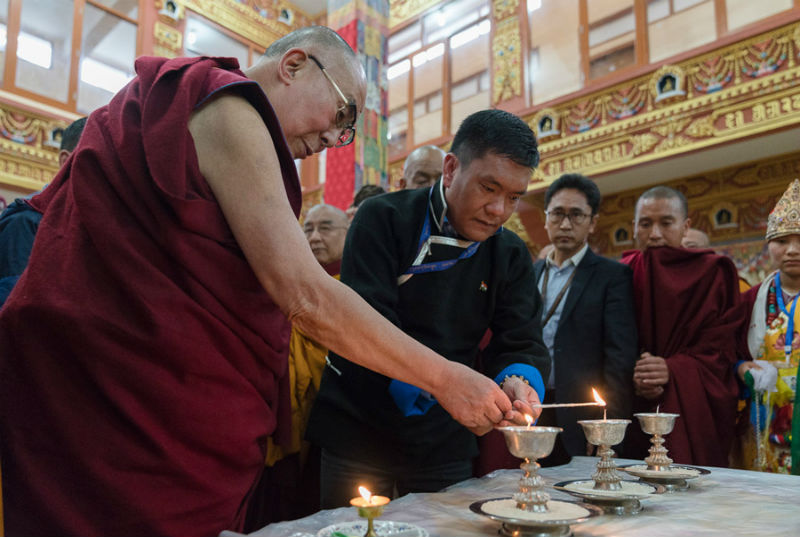 Bomdila, Arunachal Pradesh, India — Calling censorship of media is morally wrong and harmful, the spiritual leader of Tibet, His Holiness the Dalai Lama Thursday said, "the 1.3 billion Chinese people have every right to know the reality."
Bomdila, Arunachal Pradesh, India — Calling censorship of media is morally wrong and harmful, the spiritual leader of Tibet, His Holiness the Dalai Lama Thursday said, "the 1.3 billion Chinese people have every right to know the reality."
While responding to reporters in India's state of Arunachal Pradesh, on April 6, 2017, His Holiness called China an authoritarian country. "Nine years with Chinese communist, sometimes I express His Holiness the Dalai Lama jokingly said, "During this period, I have learned how to practice hypocrisy. Some system is sort of totalitarian, and authoritarian system, and no proper freedom."
"So I am always telling Chinese," His Holiness the Dalai Lama said, adding: "The 1.3 billion Chinese people have every right to know the reality. Once the Chinese people know the reality, the 1.3 billion Chinese people also have the ability on that basis to judge what is right or wrong. Therefore, censorship of media is morally wrong and harmful."
His Holiness also advocated major changes in the country's judicial system. "Then another thing; the Chinese judicial system itself should raise up-to international standard, because I met a number of Chinese peasants, who are very poor when I inquired their conditions in their villages. Its very difficult. The local authorities' only concern is money for themselves and are not concerned with the condition of the locals, like farmers."
The 81-year-old Nobel Peace Prize Laureate's message of spreading peace has reached millions of people and some of them happen to be in China as well. "Many Chinese Buddhists, mostly from the mainland, come to see me in tears. In most cases, they ask me not to forget them and invite me to China, and of course Tibet. I tell them as soon as the Chinese government starts showing some positivity towards me, I am ready to come."
Calling himself a "student of the Nalanda tradition" of learning, the Dalai Lama said: "I am a student of the Nalanda tradition and use logic for everything. My visit to India's northeast is purely spiritual and religious. This is a non-political issue and the Chinese representatives should come here and see the work we are doing."
Citing the example of the benefits and the assistance given to Haj pilgrims, His Holiness also had a proposal to make. "Historically, China is a Buddhist country and a follower of the Nalanda tradition. So I suggest the concerned Indian officials to ensure that India makes some specific arrangements for pilgrims."
"Similarly, some sort of arrangements must be made to facilitate convenient travel of Chinese Buddhists to India. Buddhists have been living in China for more than 400 million years. Such arrangements will help Chinese Buddhists come for pilgrimage to India and see sacred places," he added.
Tibet was invaded by Communist China in 1949. Since that time over 1.2 million out of 6 million Tibetans have been killed, over 6000 monasteries have been destroyed— acts of murder, rape and arbitrary imprisonment, torture and cruel, inhuman and degrading treatment were inflicted on the Tibetans inside Tibet, Beijing calls a "peaceful liberation".
In 1959, His Holiness the 14th Dalai Lama along with thousands of others escaped to India, where he was given political asylum. The spiritual leader has set up a government and rebuilt monasteries where masters pass on their teachings to young monks. Tibetans in exile have succeeded in gradually rebuilding their monasteries, preserving their culture and restructuring their society and keeping it alive, in spite of the extremely difficult circumstances.
For his part, the Tibetan spiritual leader travels around the world spreading a message of Peace and Universal Responsibility. He believes that the common aim of all religions, an aim that everyone must try to find, is to foster tolerance, altruism and love. He retired from politics in 2011. But, as one among six million Tibetans, His Holiness said he will continue to serve the cause of Tibet.
The Tibetan leader seeks genuine autonomy for the Tibetan people within the scope of the Constitution of the PRC through Middle Way Approach. But Beijing's Communist regime views the spiritual leader as an agitator and has repeatedly rejected calls for autonomy for his homeland of Tibet.


![Tibet has a rich history as a sovereign nation until the 1950s when it was invaded by China. [Photo: File]](/images/stories/Pics-2024/March/Tibet-Nation-1940s.jpg#joomlaImage://local-images/stories/Pics-2024/March/Tibet-Nation-1940s.jpg?width=1489&height=878)















